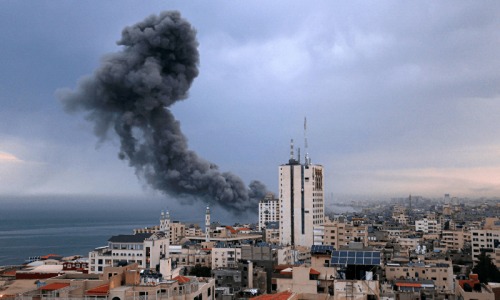In Islamabad, a roundtable conference titled ‘Geostrategic Conundrums: A Comprehensive Analysis of the Hamas-Israel Conflicts Impact on Pakistan’ has stirred discussions among former diplomats and experts. The event, organized by the Pakistan Institute for Conflict and Security Studies (PICSS), highlighted concerns that a tepid stance from Pakistan and the broader Muslim world regarding the Gaza conflict could trigger a public backlash.
The conference witnessed the participation of prominent figures, including former Pakistani envoy to Egypt, Mushtaq Shah, PICSS Managing Director Abdullah Khan, retired Maj Gen Saad Khattak, who served as a former high commissioner to Sri Lanka, and NUST Assistant Professor Dr. Farah Naz. These individuals offered insights into the geostrategic complexities surrounding the ongoing conflict and the potential repercussions of Pakistan’s stance.
Roundtable Conference Analyzes Geostrategic Conundrums
At the heart of the discussion was the concern that a lukewarm stance on the Palestine issue could incite public outrage within Pakistan and the wider Muslim world. Former ambassador Mushtaq Shah urged that allowing the public to express their anger and frustration is imperative. He cautioned that stifling such expressions could result in public uprisings that might challenge existing governments.
Shah emphasized that Pakistan’s support for the Palestinian cause is rooted in principles of decolonization and a common faith. While acknowledging that Pakistan does not have a bilateral dispute with Israel, he maintained that direct involvement in the current conflict is unnecessary. The former ambassador also deemed the peace deal between Saudi Arabia and Israel as “the first casualty of the Hamas attack,” implying that the ongoing crisis has made any normalization with Israel improbable.
Diplomatic Tone Urged in Dealing with Sensitive Israel-Palestine Conflict
Maj Gen Saad Khattak emphasized the importance of balance and fairness in Pakistan’s official stance on the Gaza conflict. He underscored the need for both condemnation of violence against innocent Israelis by Hamas and criticism of the Israeli occupying forces’ actions in Gaza. Khattak contended that Pakistan’s official position appeared weak and failed to represent the aspirations of the people.
Dr. Farah Naz, an assistant professor at NUST, advocated for a diplomatic approach to the complex issue, drawing parallels with the diplomatic strategies of the United States and China. She acknowledged that the Israel-Palestine conflict is a highly sensitive subject and suggested that a diplomatic resolve, involving international law and organizations, is essential to maintain support for the Palestinian cause while managing the considerable economic pressure on Pakistan.
Potential Impact of Gaza Conflict on International Militant Groups
Abdullah Khan, PICSS Managing Director, shed light on the potential repercussions of the Gaza conflict on international militant groups. He expressed concerns over the possibility of another wave of militants migrating to the Middle East, particularly from the Pak-Afghan region.
However, Mushtaq Shah contested this notion, arguing that such global jihadi migrations have historically been tied to Western geostrategic objectives. Whether it was the Afghan Jihad in the 1980s, conflicts in the Balkans and Caucasus in the 1990s, or recent events in Syria, Iraq, and Libya, Shah maintained that these migrations were closely linked to Western interests.
The conference illuminated the multifaceted nature of the Gaza conflict, reflecting the intricate web of geostrategic considerations, public sentiments, and diplomatic complexities that define the response of Pakistan and the wider Muslim world to this enduring crisis. As the world watches these deliberations unfold, the path forward remains unclear, with hopes for a peaceful resolution always at the forefront.















